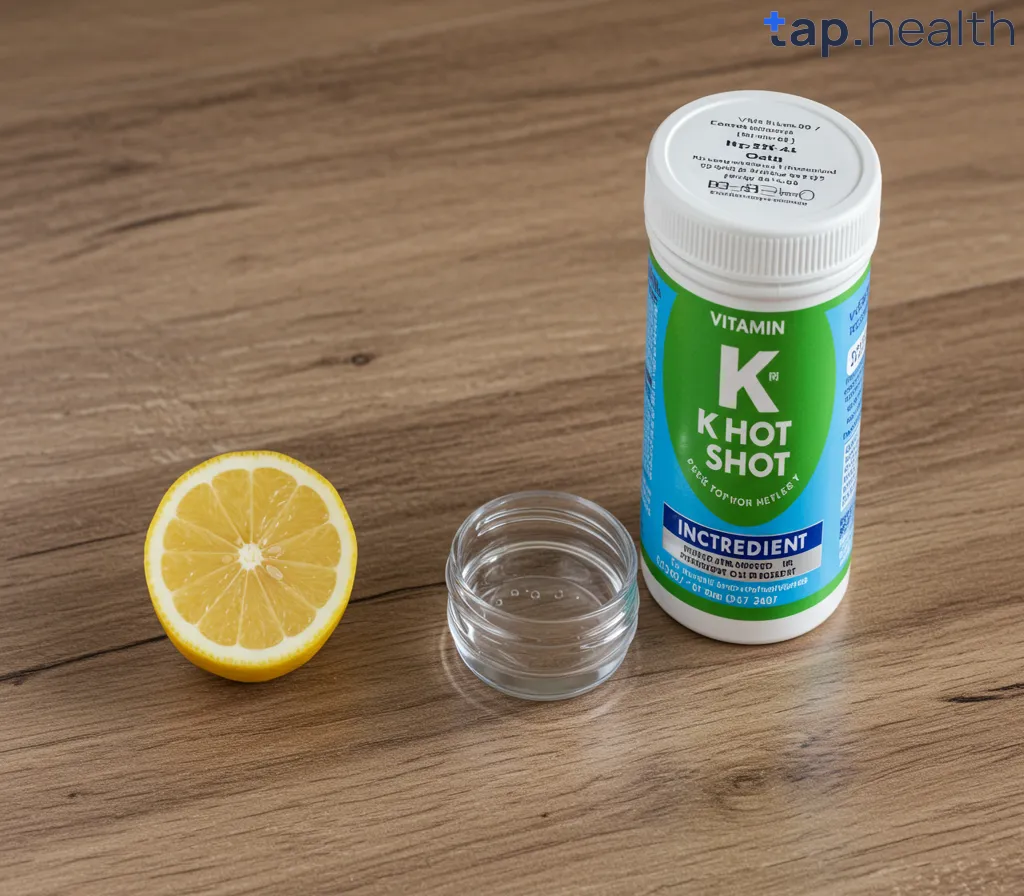If you’ve ever walked down the supplement aisle or browsed online for vitamin C, you’ve probably seen a bottle labeled “Ester-C®” and wondered: What is ester vitamin C? Is it better than regular vitamin C? And why does it cost more?
You’re not alone.
“Ester-C” is one of the most talked-about forms of vitamin C—but most people don’t really know what it is, how it works, or if it’s actually worth choosing over the basic stuff.
So let’s clear it up—in simple, everyday language, no confusing science terms.
In this guide, you’ll learn:
- What ester vitamin C really is
- How it’s different from regular vitamin C
- What benefits it claims to have
- Who should (and shouldn’t) use it
- And answers to all the most common questions people search
We’ve researched this from trusted sources like the National Institutes of Health (NIH), Mayo Clinic, Cleveland Clinic, Linus Pauling Institute, and peer-reviewed journals to make sure everything is accurate, reliable, and easy to understand.
Let’s get started.
What Does “Ester” Mean in Ester Vitamin C?
First, let’s break down the name: “Ester-C”.
The word “ester” comes from chemistry. An ester is a compound formed when an acid and an alcohol combine. In this case, it’s a special form of vitamin C (ascorbic acid) that’s been changed to make it gentler and easier for your body to use.
So, ester vitamin C (also known as Ester-C®) is a modified form of vitamin C that’s designed to be:
- Less acidic
- Better absorbed
- Longer-lasting in the body
- Easier on the stomach
It’s not a different vitamin—it’s still vitamin C, just in a smarter, more body-friendly form.
What Is Ester-C Made Of?
Ester-C isn’t just one ingredient. It’s a unique blend that includes:
- Calcium ascorbate – The main form of vitamin C in Ester-C. It’s less acidic than plain ascorbic acid.
- Dehydroascorbic acid (DHA) – A form of vitamin C your body can quickly convert and use.
- Calcium threonate – Helps vitamin C stay in your body longer.
- Other vitamin C metabolites – Natural byproducts that help your immune cells absorb and use vitamin C more efficiently.
Together, these compounds make Ester-C a “buffered” and “bioavailable” form of vitamin C—meaning it’s easier to absorb and stays in your system longer.
How Is Ester-C Different from Regular Vitamin C?
This is the big question: Is Ester-C better than regular vitamin C?
Let’s compare them side by side.
| Acidity | High – can cause stomach upset | Low – gentle on the stomach |
| Absorption | Good, but fast | Better and longer-lasting |
| pH Level | Acidic (~2.5) | Neutral (~7.0) – “buffered” |
| Stomach Friendly? | No – can cause heartburn or nausea | Yes – much gentler |
| Immune Support | Yes | Yes – with added metabolites |
| Cost | Low | Higher |
So, What’s the Bottom Line?
- Regular vitamin C works great for most people and is cheap.
- Ester-C is a premium version designed for people who:
- Have sensitive stomachs
- Want longer-lasting effects
- Are looking for extra immune support
Think of it like this:
Regular vitamin C is like a regular battery.
Ester-C is like a rechargeable battery that lasts longer and doesn’t leak.
Why Is Ester-C Less Acidic?
Regular vitamin C (ascorbic acid) is highly acidic. That’s why some people get heartburn, nausea, or stomach cramps when they take high doses.
Ester-C fixes this by turning ascorbic acid into calcium ascorbate, a neutral-pH form of vitamin C.
Because it’s not acidic, it’s:
- Easier on your stomach lining
- Safer for people with acid reflux or ulcers
- Better tolerated at higher doses
This makes Ester-C a top choice for anyone who’s ever felt sick after taking a regular vitamin C tablet.
Does Ester-C Stay in Your Body Longer?
Yes—this is one of Ester-C’s biggest selling points.
Studies show that Ester-C raises and maintains vitamin C levels in white blood cells (key immune cells) longer than regular ascorbic acid.
Why?
Because of the natural metabolites in Ester-C—especially threonate. These compounds help vitamin C get into your cells more easily and stay there longer.
One study found that Ester-C led to higher levels of vitamin C in white blood cells for up to 24 hours compared to regular vitamin C.
That means your immune system gets a longer-lasting boost—not just a quick spike.
What Are the Benefits of Ester Vitamin C?
Now that you know what it is, let’s talk about what Ester-C can do for you.
1. Stronger Immune Support
Vitamin C is famous for supporting your immune system—and Ester-C may do it even better.
It helps your body:
- Produce more white blood cells
- Fight off viruses and bacteria
- Reduce the length and severity of colds
Because Ester-C stays in immune cells longer, it may offer more consistent protection—especially during cold and flu season.
2. Gentler on the Stomach
If you’ve ever taken a 1,000 mg vitamin C tablet and felt a burning sensation, you’re not alone.
Ester-C’s neutral pH makes it much easier to tolerate, even at high doses.
This is especially helpful for:
- People with acid reflux
- Those with sensitive digestion
- Anyone who takes vitamin C daily
3. Better Absorption
“Bioavailability” means how well your body can absorb and use a nutrient.
Ester-C is designed to be more bioavailable than regular vitamin C because:
- It’s less acidic (so it doesn’t irritate the gut)
- It includes metabolites that help it enter cells faster
- It stays in the bloodstream longer
This means more vitamin C actually gets to where it’s needed.
4. Supports Healthy Skin
Vitamin C is a must-have for glowing skin. It helps make collagen, the protein that keeps your skin firm and smooth.
Ester-C supports skin health by:
- Reducing damage from sun and pollution
- Helping repair skin tissue
- Fighting free radicals that cause aging
Many skincare products use vitamin C—and taking Ester-C can boost those effects from the inside.
5. Antioxidant Power
Vitamin C is a powerful antioxidant, which means it helps protect your cells from damage caused by pollution, stress, and UV rays.
Ester-C provides the same antioxidant benefits—but with less stomach upset.
6. May Reduce Inflammation
Chronic inflammation is linked to heart disease, arthritis, and other long-term health issues.
Vitamin C helps reduce inflammation, and because Ester-C stays in the body longer, it may offer more consistent anti-inflammatory effects.
Who Should Use Ester-C?
Ester-C isn’t for everyone—but it’s a great choice for certain people.
Ideal for:
- People with sensitive stomachs
- Those who take high doses of vitamin C
- Older adults (digestion slows with age)
- People with acid reflux or ulcers
- Anyone wanting longer-lasting immune support
- Those who get cramps or nausea from regular C
Not Necessary For:
- Healthy people who tolerate regular vitamin C fine
- Those on a tight budget (Ester-C is more expensive)
- People taking low doses (under 500 mg)
If you’re happy with regular vitamin C and it doesn’t bother you, there’s no urgent need to switch.
But if you’ve ever thought, “I need vitamin C, but it makes me feel sick,” Ester-C could be a game-changer.
How Much Ester-C Should You Take?
The amount you need depends on your age, health, and goals.
General Daily Recommendations:
| Adult men | 90 mg |
| Adult women | 75 mg |
| Smokers | +35 mg (damaged by smoke) |
| Pregnant women | 85 mg |
| Breastfeeding women | 120 mg |
But many people take 500–1,000 mg daily for immune support.
With Ester-C, you can safely take higher doses because it’s gentler.
Typical Ester-C doses:
- Daily maintenance: 500–1,000 mg
- Cold/flu season: 1,000 mg twice a day
- High stress or illness: Up to 2,000 mg/day (split into doses)
Always follow label instructions and talk to your doctor if you have health issues.
Is Ester-C Safe?
Yes. Ester-C is generally recognized as safe (GRAS) by the FDA.
It’s been studied for decades and used by millions.
Possible Side Effects (Rare):
- Mild diarrhea (only at very high doses)
- Gas or bloating (uncommon)
- Kidney stones (only in people prone to them and taking very high doses)
But because Ester-C is less acidic and better absorbed, it’s less likely to cause side effects than regular vitamin C.
Who Should Be Cautious?
- People with kidney disease – high vitamin C can increase oxalate levels
- Those with hemochromatosis (iron overload) – vitamin C increases iron absorption
- Anyone on chemotherapy – talk to your doctor first
Can You Take Ester-C Every Day?
Yes. You can take Ester-C daily, just like regular vitamin C.
Since your body doesn’t store vitamin C, you need to replenish it every day.
Ester-C is especially good for daily use because:
- It’s gentle on your stomach
- It builds up in your immune cells over time
- It supports long-term health
Many people take it year-round for consistent immune and skin support.
Ester-C vs. Other Vitamin C Forms
There are many types of vitamin C on the market. Let’s compare Ester-C to the most common ones.
1. Ascorbic Acid (Regular Vitamin C)
- Cheap and effective
- Acidic – can upset stomach
- Fast absorption, quick exit
Best for: Healthy people on a budget
Not ideal for: Sensitive stomachs
2. Sodium Ascorbate
- Buffered (less acidic)
- Contains sodium – not good for people on low-salt diets
Better for: Stomach sensitivity
Watch out for: High sodium content
3. Liposomal Vitamin C
- Wrapped in fat bubbles for better absorption
- Expensive
- May offer high blood levels
Best for: Maximum absorption
Costly and less proven long-term
4. Time-Release Vitamin C
- Releases slowly over hours
- May not release fully in gut
Good for: Steady levels
Not always reliable
5. Ester-C
- Neutral pH, gentle
- Long-lasting in immune cells
- Backed by research
Best for: Daily immune support, sensitive stomachs
Balanced choice: effective, safe, well-studied
Does Ester-C Really Work?
Yes—but let’s be honest: it’s not magic.
Ester-C does work, and studies support its benefits:
- A 2006 study found Ester-C raised vitamin C levels in white blood cells more than ascorbic acid.
- Another study showed it caused less stomach upset at high doses.
- Research confirms it’s well-absorbed and long-lasting.
However, regular vitamin C also works well for most people.
So, does Ester-C work better?
For immune cell retention and stomach comfort—yes.
For basic vitamin C needs—regular C is just fine.
It’s not that Ester-C is “stronger”—it’s that it’s smarter and gentler.
Where Can You Buy Ester-C?
Ester-C is a registered trademark, so only products that meet specific standards can use the name.
Look for the “Ester-C®” logo on the label.
It comes in:
- Capsules
- Tablets
- Powders
- Gummies (less common)
Popular brands:
- Ester-C® Professional Formula
- Nature’s Bounty Ester-C
- Solgar Ester-C
- Amazon Elements
Make sure it says “Ester-C” on the front—not just “vitamin C with bioflavonoids” or “buffered C.”
Can Ester-C Help with Colds?
Yes. Like all forms of vitamin C, Ester-C won’t prevent colds, but it can:
- Shorten the length of a cold
- Reduce symptoms like runny nose and fatigue
- Support your immune system while you fight off viruses
One review of 29 studies found that regular vitamin C users had shorter colds by 8% in adults and 14% in kids.
Since Ester-C stays in immune cells longer, it may offer even better day-to-day protection.
But don’t expect miracles. Start taking it before you get sick for best results.
Does Ester-C Help with Skin and Aging?
Yes. Vitamin C is a superstar for skin health—and Ester-C delivers it gently.
It helps by:
- Boosting collagen – keeps skin firm and reduces wrinkles
- Fighting free radicals – protects from sun and pollution
- Brightening skin – can reduce dark spots over time
- Healing wounds – supports tissue repair
Many dermatologists recommend vitamin C for glowing skin—and taking Ester-C can support that from the inside.
Pair it with a healthy diet, sunscreen, and good sleep for best results.
Is Ester-C Worth the Money?
That depends on your needs.
Pros of Ester-C:
- Gentle on the stomach
- Longer-lasting in the body
- Better for daily immune support
- Trusted and well-researched
Cons:
- More expensive than regular vitamin C
- Not always necessary for healthy people
Verdict:
If you have a sensitive stomach or want steady immune support, Ester-C is worth the extra cost.
If you’re healthy and fine with regular C, you can save money and get similar benefits.
Frequently Asked Questions (FAQ) on What is ester vitamin C?
Q1: What is ester vitamin C?
Ester vitamin C (Ester-C®) is a special, non-acidic form of vitamin C made from calcium ascorbate and natural metabolites. It’s gentler on the stomach and stays in your immune cells longer than regular vitamin C.
Q2: Is Ester-C better than regular vitamin C?
It’s not “better” for everyone, but it’s better for people with sensitive stomachs and those who want longer-lasting immune support. It’s less acidic and more bioavailable.
Q3: Does Ester-C cause stomach upset?
No. Ester-C is designed to be gentle on the stomach. Because it’s neutral pH (not acidic), it rarely causes heartburn, nausea, or cramps—unlike regular vitamin C.
Q4: How is Ester-C made?
Ester-C is made by mixing ascorbic acid with calcium and natural metabolites. The process removes acidity and creates a buffered, easily absorbed form of vitamin C.
Q5: Can you take Ester-C every day?
Yes. Ester-C is safe for daily use. Many people take it year-round to support immunity, skin, and overall health.
Q6: Does Ester-C really stay in your body longer?
Yes. Studies show Ester-C raises vitamin C levels in white blood cells and keeps them elevated longer than regular ascorbic acid—thanks to its unique metabolites.
Q7: Is Ester-C natural?
Yes. Ester-C is made from natural vitamin C and contains naturally occurring metabolites. It’s not synthetic.
Q8: Can Ester-C prevent colds?
No vitamin C can fully prevent colds. But Ester-C may shorten colds and reduce symptoms by supporting your immune system.
Q9: Is Ester-C good for skin?
Yes. Like all vitamin C, Ester-C supports collagen production, fights aging, and brightens skin. Its gentle form makes it ideal for daily use.
Q10: What’s the difference between buffered C and Ester-C?
“Buffered C” is a general term for less acidic vitamin C (like calcium or sodium ascorbate). Ester-C is a specific, patented form with added metabolites for better absorption and retention.
Q11: Can you take Ester-C with other vitamins?
Yes. Ester-C works well with other supplements like vitamin D, zinc, and probiotics. It’s often included in immune support blends.
Q12: Does Ester-C have bioflavonoids?
Some Ester-C products include bioflavonoids (plant compounds that help vitamin C work better), but not all. Check the label if you want them.
Q13: Is Ester-C safe for kids?
Yes, in appropriate doses. Children’s needs are lower (45–75 mg/day). Use a children’s formula or consult a pediatrician before giving high doses.
Q14: Can you take too much Ester-C?
Very high doses (over 2,000 mg/day) may cause diarrhea or increase kidney stone risk in sensitive people. But Ester-C is less likely to cause issues than regular C.
Q15: Does Ester-C interact with medications?
Generally no, but vitamin C can affect certain drugs like blood thinners or chemotherapy. Always talk to your doctor if you’re on medication.
Final Thoughts: What Is Ester Vitamin C—And Should You Use It?
So, what is ester vitamin C?
It’s a gentler, longer-lasting, and more body-friendly form of vitamin C—ideal for people who want immune support without the stomach burn.
It’s not a miracle cure, but it’s a smart upgrade for:
- Those with digestive sensitivity
- Anyone taking high doses
- People looking for steady, all-day protection
If you’ve ever said, “I need vitamin C, but it makes me feel awful,” Ester-C might be the solution you’ve been looking for.
It’s backed by science, trusted by millions, and designed to work with your body—not against it.
At the end of the day, the best vitamin C is the one you can take every day without discomfort.
And for many people, that’s Ester-C.



